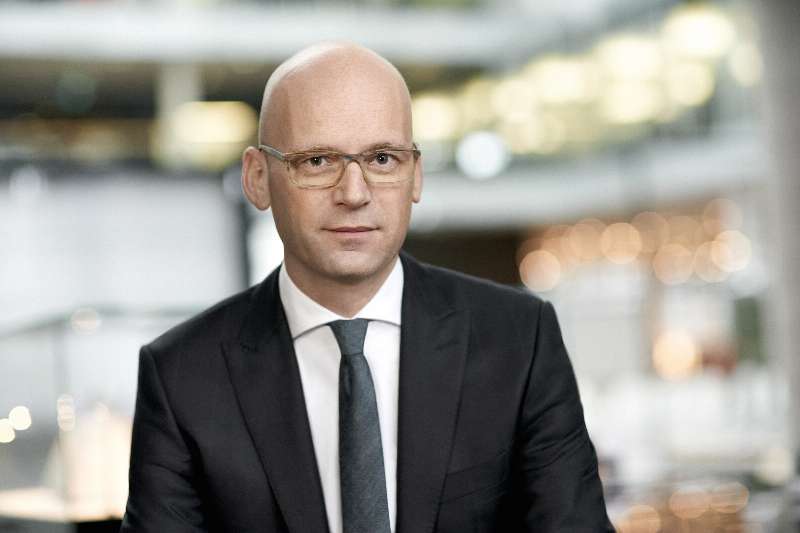Millennials show Hugo who's Boss


Luxury fashion house CEO Mark Langer strives to blend inspiration and transaction
For German luxury fashion house Hugo Boss, its fashion show at Tank Shanghai on Oct 18, a Friday, was more about showcasing its new collection than anything else. It was a resounding statement of the brand's commitment to the Chinese market, said the company's CEO Mark Langer.
"We have a very special connection with Shanghai. The first store we ever opened in China was here, along the Bund. Shanghai is the city where it all started," he said in an exclusive interview at The Middle House, a luxury hotel in downtown Shanghai.
"This fashion show is about sending a very strong message to the Chinese market that we're here to stay and are eager to show a new level of commitment."
The fashion show, the company's first in China in six years, comes on the back of what Langer calls "robust growth" in the Chinese mainland market. According to the German, China is a key driver of the company's growth.
He said while the Macao and Hong Kong markets are currently experiencing a slowdown, the brand's stores in major cities such as Beijing and Shanghai have been posting double-digit growth throughout the year.
Some of the key factors behind Hugo Boss' emphatic growth in China, said Langer, is its focus on integrating its digital and physical retail channels, increasing its presence on social media, as well as partnering brands that resonate with the Chinese audience.
Some of these efforts in recent years have taken the form of a soccer-themed event in Shanghai's IAPM shopping mall, releasing a gift-hunting game on WeChat, and leveraging its sponsorship of Spanish soccer giant Real Madrid, which is highly popular in China.
Another key factor is the purchasing power of Chinese consumers, especially those from the millennial generation.
"Chinese consumers are on average 15 to 20 years younger than our European customers. In China, we are especially catering to the millennials. The majority of our Chinese consumers are younger than 35 years," said Langer.
"Millennials are very curious about the product origin. They want to understand the product. As such, storytelling is especially important for Chinese consumers."
While the brand's high-end casual wear has traditionally been the most popular among Chinese consumers, Langer noted that there has been strong growth in the sales of formal wear, particularly Hugo Boss' most premium offerings - made-to-measure suits that typically cost between 2,000 euros ($2,201.4) and 3,000 euros.
"Chinese consumers have a true love for the extreme end of our sophisticated collection. When it comes to our most advanced products - the made-to-measure offerings - China accounts for more than 50 percent of our global sales," he said.
"These suits represent a sizeable investment, but Chinese consumers have shown that they possess a very fine appreciation for the craftsmanship and the quality of the fabrics, and the comfort they afford."
Since taking over as CEO from Claus-Dietrich Lahrs in 2016, Langer has been pivotal in shifting the company's focus to bolstering its online business and media exposure. These efforts have not been in vain - the company's global online sales in the final quarter of 2018 were up by double digits.
Its 2018 annual report also stated that three-quarters of the marketing budget in the coming years will go to digital marketing, and that a key focus would be on "expanding the company's presence in relevant social networks". In a previous interview with Vogue Business, Langer said that he is looking to quadruple last year's e-commerce sales of 110 million euros by 2022.
"People are changing their shopping behaviors. They no longer go to our stores to discover new collections. All this is done on social media," explained Langer.
"But we believe physical stores will still play an important role. Things will just become increasingly integrated.
"Today, omnichannel sales are probably one of the biggest technical evolutions of the retail market globally, and this is especially so in China. We will continue to work with transactional platforms in China to provide consumers with a seamless integration between inspiration and transaction."
Looking ahead, Langer pointed out that the company will, in line with the increasing popularity of casual office wear around the world, release more casual apparel and make a bigger push for its Hugo brand, which offers more contemporary fashion options.
He said Hugo Boss will be opening more stores in China over the coming years while further enhancing its e-commerce capabilities and collaborations with local partners and personalities. An increase in marketing efforts for the Boss Womenswear collection is also on the cards.
"We believe that there's still more room for growth in China. The key is to be consistent in our branding globally. Whether you are in Singapore or London or Shanghai, once you are in our stores, you should get the same world of Boss," he said.
"Certain elements might be more important in China than in Hamburg, but to be generally consistent in our global execution is the core element of a successful global luxury business."




































